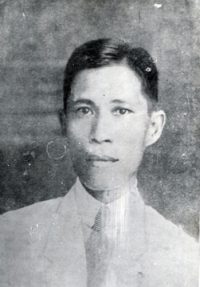Yesterday afternoon about 5 o’clock news came through an Igorrote that many armed forces had arrived in Babuyan. He could not say for certain whether the forces are ours or those of the enemy, since he is not yet accustomed to distinguish them, but he says their faces are similar to ours. Two Igorrote spies were immediately dispatched to said point, to reconnoiter (and determine) if the forces are our own or those of the enemy. Our said spies returned the following day, the 21st, at about 8 a.m., reporting that there was no such a force. Immediately on receipt of the information that there were forces in Babuyan, all our troops got ready for the march to Ambayuan, with the ladies who are accompanying us. But the ladies will go forward with Captain Villareal’s soldiers, who will serve them as a guard. Col. Manuel Sytiar, of the staff, has gone along with them. Afterwards the remaining forces will march with the honorable president. The departure of the women, including the P. [must have intended “M.,” mother—J. C. H.] and the sister of the honorable president, took place at 7.20 this morning; and they had scarcely gone a distance of 2 kilometers when our spies arrived [from Babuyan—J. C. H.]. On being informed that there was no such force in Babuyan, the honorable president changed his idea about taking up the march and told Barcelona and Villa that as the day was already well advanced, and hence night would overtake us on Mount Polis, he for his part preferred to start on the following day.
The sun is beclouded; it is a sad day to us. The fresh breeze gently moves the trees. The separation from the women—from those beings who give us life and courage—or, better said, our solitude in this mountain, throughout every part of which is seen only the abyss of death—sorely afflicts us.
That atmosphere of grief compelled Barcelona and Villa to express their opinion to the honorable president to the effect that having decided to march it would be best to do so, as it was very probable that we would have to spend the night in Ambayuan anyway. In view of these statements the honorable president agreed that we should continue the journey. So in fact we started from Banane at 10.45 a.m. We commenced to ascend that lofty Mount Polis, which is 2,700 meters high. Continuing our march without cessation, at 5 o’clock in the evening we passed a beautiful spring, and there we ate a little to refresh ourselves. But we had not yet covered half the ascent.
After dinner, which never required fifteen minutes, we resumed the march.
Night is coming upon us; our vision grows dim, our legs and knees are already weak and tremulous, our breathing laborious, and the thirst is intense. The clinging mud increases our troubles. The night is very dark. The leafy mountain trees shut out the starlight of the heavens. We no longer see one another. Along that narrow path—18 inches wide—which we travel lie the deep precipices of death; and looking down into their depths suffices to make one have a feeling of faintness and swimming in the head, or to imagine himself on the edge of death. Each one of us uses as a guide the trunk [sic] of a tree, probing into the darkness with the point of it for the location of an abyss.
It is 9 o’clock at night. We are perhaps at an elevation of some 2,300 meters. Ascents are still awaiting us; hunger! thirst!—we are sick and faint. Corporeal fatigue prostrates us; darkness terrifies us; yet we continue our journey, almost crawling. We reach the summit at 10 o’clock at night. Here we see the firmament, since the top of the mountain is not covered with trees.
Our breathing is more easy. We stop on the summit to rest a little. We are exhausted; we lie down on the ground without a “petate.” [Native bedcovering of woven bamboo.—J. C. H.]. The intense cold makes our teeth chatter. Soon a profound slumber and great exhaustion has robbed us of intelligence.
At 2 o’clock in the morning the honorable president awoke and ordered that we should continue the march. We all awoke with our clothes wet with dew.
The march is not painful now, because we are descending this lofty mountain, which is 2,700 meters high. We pay no attention to the hunger and thirst; it is only the cold that troubles us.
The aurora of the day scatters her first rays upon the universe; and the small amount of light gives us courage. Our march is more rapid in proportion as the daylight appears; we are also nearing the foot of the mountain. We continue the descent.
